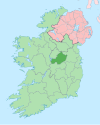Clare, County Westmeath
Clare (from Irish Clárach, meaning 'a level place')[1] is a townland in Killare, Rathconrath, County Westmeath, Ireland.
Its chief geographical features are Clare Hill which reaches a height of 433 feet, small streams, forestry plantations and dug wells.
[2] The earliest surviving mention of Clare is in the Táin Bó Cúailnge set in the first century A.D. which states (lines 4227-4230)- Is and sain ra gabsatar cethri ollchóiceda Hérend dúnad & longphort ac Cláthra in n-aidchi sin.
Ra fácsatar fiallach foraire & freccométa úathu ra hagid Ulad ná tístais Ulaid gan robud gan rathugud dá saigid, ('Then the four great provinces of Ireland made their encampment at Clártha that night.
Raseisset a n-éiti for Gárig & Ilgárig isin matin se monairther, ('On that same night, Dubthach Doel ('the Scorpion') of Ulster uttered these words in his sleep among the men of Erin at Slemain Mide that night: "Great be the morn, The morn of Meath!
He refers to Clare in his poem Airec Menman ('The Stratagem of Urard (Irard) mac Coisse'),[4] about a cattle raid on his farm c. 956 A.D., as follows- Irard mac Coisi arrainic ind urec menmansa do ceneol iarna indred co hindligthech i cinaidh Muiredaigh mic Eogain do guin do co nairnecht indliged friss co rucsat a bú a seotu 7 gur airgset a dún feissin .i.
Clarthá, (The homestead of the poet Urard mac Coisse in Clartha is raided by the family of ard-rí Domnall úa Néill).
If it was one of you who took them away, his warriors will not survive "O you warriors" ') The Annals of the Four Masters for 1544 A.D. states- Rory O'Melaghlin was slain at Clartha, by Richard Dalton and his kinsmen, in a nocturnal assault; and it was for the interests of Kedagh O'Melaghlin they committed this slaughter, (Rudhraighe Ó Maoíleachlainn do mharbhadh h-i c-Clartha lá Risderd Dalatún, & lá a bhraithribh ar amus oidhche, & as ar mhaith do Chédach Ua Maoíleachlainn do-rónsat an marbhadh íshin).
